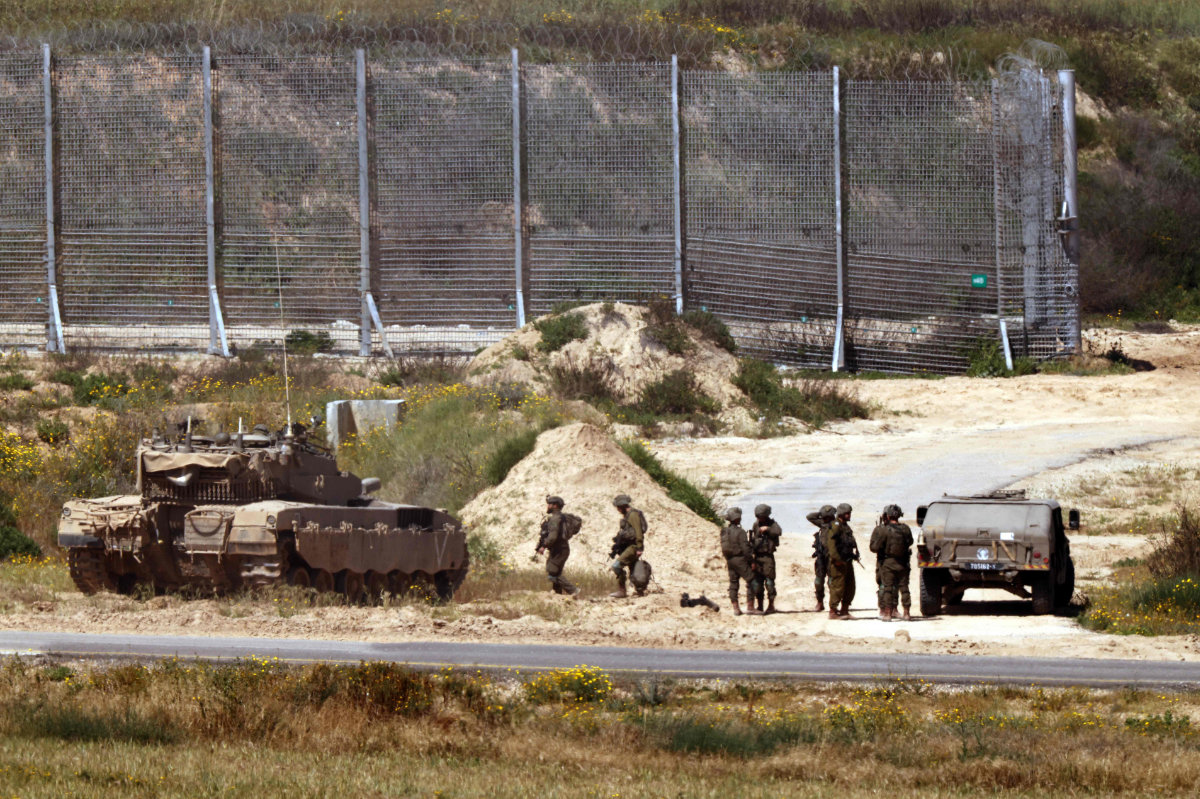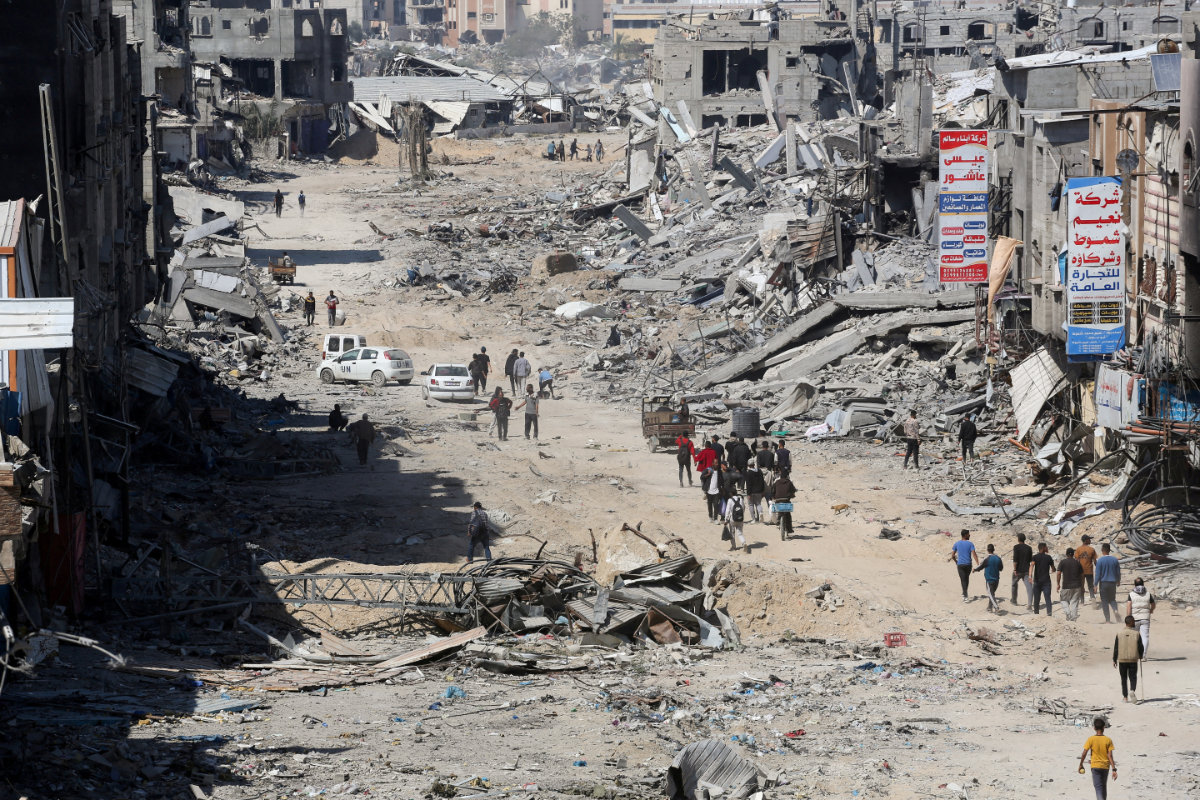JEDDAH: Israeli troops pulled out of Khan Younis in southern Gaza on Sunday after months of fierce fighting half a year into the war sparked by the attack against Israel by Hamas militants on October 7.
Israel’s Defense Minister Yoav Gallant said the withdrawal was because “Hamas ceased to exist as a military framework” in Khan Younis, just north of Rafah, where more than 1.5 million Palestinians are sheltering. He also said the pullout was “to prepare for future missions, including ... in Rafah.”
Israel said it had withdrawn more soldiers from southern Gaza, leaving just one brigade, as it and Hamas sent teams to Egypt for fresh talks on a potential ceasefire in the six-month conflict.
After troops left areas in and around the largely destroyed city of Khan Yunis, a stream of displaced Palestinians walked there, hoping to return to their homes from temporary shelters in Rafah, a little further south.

Israeli army vehicles move in an area along the border with the Gaza Strip and southern Israel on April 4, 2024. On Sunday, most of Israel's troops pulled out of Khan Younis in the southern Gaza Stirop after six months of war. (AFP)
Khan Yunis is the hometown of Hamas’s Gaza chief Yahya Sinwar, whom Israel accuses of being the mastermind of the October 7 attacks.
The Israeli army said a “significant force” would stay on elsewhere in the besieged territory as Prime Minister Benjamin Netanyahu said Israel was “one step away from victory.”
“Israel is ready for a deal. Israel is not ready to surrender,” Netanyahu said to his Cabinet in a speech to mark six months since Hamas’s attack that resulted in the deaths of 1,170 people, mostly civilians, Israeli figures show.
On a day when talks toward a truce deal were set to resume in Cairo, Netanyahu also stressed that “there will be no ceasefire without the return of hostages.”
He is facing intense pressure at home from families and supporters of captives seized by the militants as well as from a resurgent anti-government protest movement.
“The war in Gaza continues, and we are far from stopping,” said Israel’s military Chief of Staff Herzi Halevi. “This is a long war, with varying intensity.”
Growing global opposition
World leaders have expressed alarm at the prospect of an invasion of the city, near the Egyptian border, where most of Gaza’s population has taken shelter.
The UN and international aid organizations decried the devastating toll of the war, warning that the Palestinian territory had become “beyond catastrophic.”
“Six months is an awful milestone,” the International Federation of Red Cross and Red Crescent Societies said, warning that “humanity has been all but abandoned.”
The war broke out on Oct. 7 with an attack by Hamas militants that resulted in the deaths of 1,170 people. Hamas and Islamic Jihad militants also took more than 250 hostages — 129 of whom remain in Gaza, including 34 who the army says are dead.
Israel’s retaliatory offensive has killed at least 33,175 people in Gaza, mostly women and children, according to the Hamas Health Ministry.
British Prime Minister Rishi Sunak said the “terrible” war “must end.” He said in a statement: “We continue to stand by Israel’s right to defeat the threat from Hamas terrorists and defend their security. But the whole of the UK is shocked by the bloodshed.
“This terrible conflict must end. The hostages must be released. The aid — which we have been straining every sinew to deliver by land, air and sea — must be flooded in.”
The outcry intensified after an Israeli drone strike killed seven aid workers — most of them Westerners — for the US-based food charity World Central Kitchen on April 1.
Vast areas of Gaza have been turned into a rubble-strewn wasteland with damage estimated at $18.5 billion to critical infrastructure, mostly housing, a World Bank report said.

Palestinians inspect destroyed residential buildings in Khan Younis, in the southern Gaza Strip, after the Israeli military withdrew most of its ground troops on April 7, 2024. (REUTERS)
Charities have accused Israel of blocking aid, but Israel has defended its efforts and blamed shortages on aid organizations’ inability to distribute assistance once it gets in.
“The denial of basic needs — food, fuel, sanitation, shelter, security and health care — is inhumane and intolerable,” World Health Organization chief Tedros Adhanom Ghebreyesus wrote on X, formerly Twitter.
Israeli security expert Omer Dostri predicted that, as more displaced Palestinians leave densely crowded Rafah, “within two months there will be a move in Rafah to destroy the remaining Hamas brigades.”
The partial withdrawal came as talks toward a truce and hostage release deal were expected to resume in Cairo, including United States, Qatari and Egyptian mediators.
United States President Joe Biden told Netanyahu on Thursday he wants a ceasefire and hostage release deal and ramped-up aid deliveries.
After the deaths of the seven aid workers, Biden — whose government is Israel’s top arms supplier and political backer — also hinted at making US support for Israel conditional on curtailing the killing of civilians and improving humanitarian conditions.
Hours after Biden’s comments, Netanyahu said Israel would allow “temporary” aid flow through Erez and Ashdod.

A man gestures from a vehicle moving past destroyed buildings along a road in Khan Yunis on April 7, 2024 after Israel pulled its ground forces out of the southern Gaza Strip, six months into the devastating war sparked by the October 7 attacks. (AFP)
Maha Thaer, a mother of four returning to Khan Yunis, said she would move back into her badly damaged apartment, “even though it is not suitable for living, but it is better than tents.”
Muhammad Yunis, 51, a Palestinian in northern Gaza, sees nothing but loss.
“Isn’t the bombing, death and destruction enough?” he asked. “There are bodies still under the rubble. We can smell the stench.”
(With AFP)



























